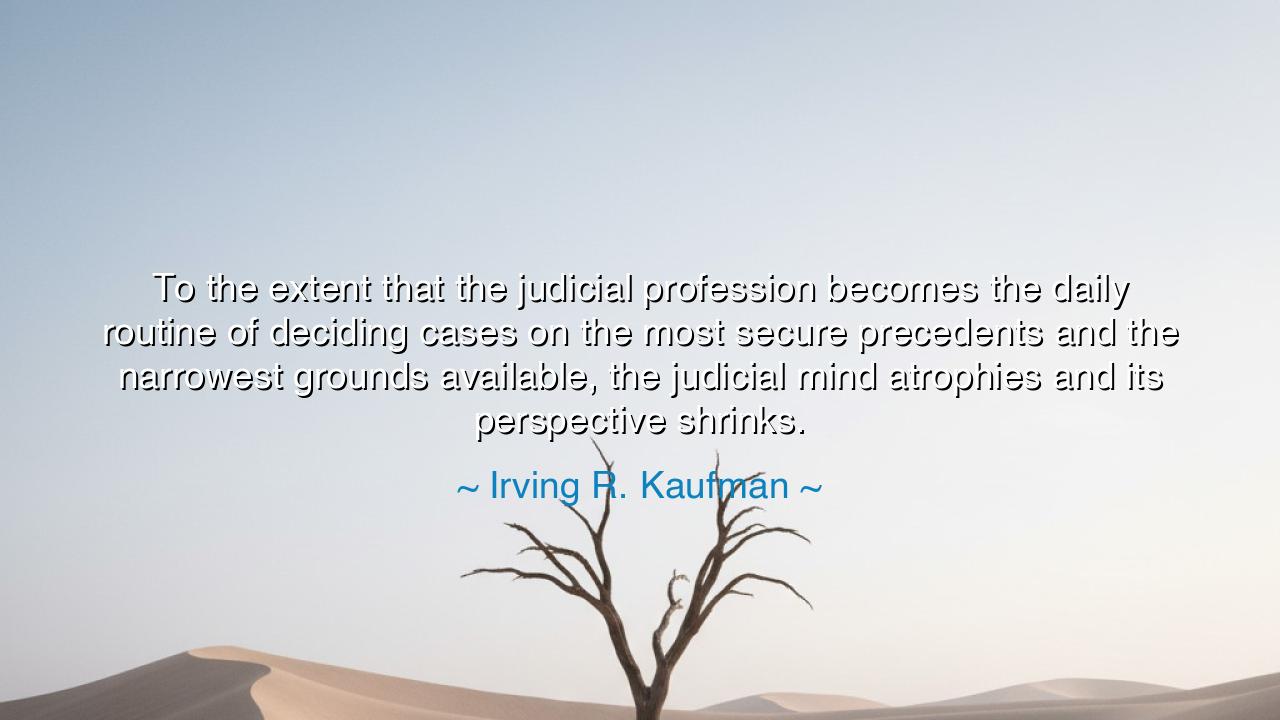
To the extent that the judicial profession becomes the daily
To the extent that the judicial profession becomes the daily routine of deciding cases on the most secure precedents and the narrowest grounds available, the judicial mind atrophies and its perspective shrinks.






“To the extent that the judicial profession becomes the daily routine of deciding cases on the most secure precedents and the narrowest grounds available, the judicial mind atrophies and its perspective shrinks.” Thus spoke Irving R. Kaufman, a judge whose long career upon the federal bench taught him not only the weight of law, but the dangers of its stagnation. In these words lies a warning to all who wield judgment — whether in courts, in councils, or in the quiet deliberations of conscience — that when the mind clings too tightly to the safety of what has been, it loses the vision to see what must be. Law, like the soul, must be alive; it must breathe, evolve, and reach beyond the comfort of habit, or else it becomes a tomb for the very justice it was meant to serve.
The origin of this quote lies in Kaufman’s reflections on the state of the American judiciary during the mid-twentieth century. He saw a legal system too often content to hide behind precedent, treating the words of past rulings as sacred scripture rather than living guidance. To decide only upon “the most secure precedents,” he warned, was to exchange wisdom for mechanical obedience. Kaufman was not urging lawlessness; he was calling for courage — the courage to interpret law with imagination, empathy, and moral insight. For when judges, or indeed any thinkers, allow their reasoning to become rote, their minds atrophy, and their vision narrows to the confines of convention.
This insight is not new to our age. The ancients knew that every principle, once created to serve life, can eventually become a prison if not renewed. The philosopher Aristotle wrote that the law must be reason “free from passion,” but he also warned that justice requires equity — the ability to see where rigid rules fall short of righteousness. The Roman jurists too understood this balance: fiat justitia ruat caelum — “Let justice be done, though the heavens fall.” Yet the temptation to cling to precedent is as old as governance itself. The judge who fears error may seek shelter in the rulings of others, but in doing so he ceases to judge; he merely repeats. And repetition, when divorced from reflection, is the slow death of truth.
History offers many examples of this peril. In the era of segregation, countless courts upheld the doctrine of “separate but equal,” invoking precedent rather than principle. They looked backward to Plessy v. Ferguson, finding in its shadow a convenient refuge for cowardice. The result was not justice, but the perpetuation of injustice under the guise of legal order. Only when Brown v. Board of Education dared to break from that precedent — when judges looked not merely to what the law had said, but to what justice required — did the legal mind of America awaken again to its higher purpose. In that moment, Kaufman’s warning found its answer: boldness in the service of truth is the cure for atrophy in the life of the mind.
And yet, Kaufman’s words speak not only to judges, but to every human soul. For all of us, in our own ways, become creatures of habit and precedent. We grow accustomed to thinking the same thoughts, defending the same beliefs, making the same decisions. Slowly, our inner vision shrinks, and the great horizons of possibility grow dim. The atrophy of the judicial mind is but a reflection of the atrophy of the human spirit — the decay that begins whenever safety is valued above growth. To live fully, as to judge wisely, one must be willing to look beyond what is familiar, to risk the discomfort of insight.
The ancients would have called this intellectual courage — the virtue that distinguishes the wise from the merely learned. For wisdom is not the endless repetition of rules, but the discerning heart that knows when rules must bend to serve a higher truth. Just as a muscle grows weak from disuse, so too does the mind grow dull when it ceases to stretch toward understanding. A good judge — like a good leader, a good artist, or a good soul — must balance reverence for the past with vision for the future. The law should be a river, not a stone: guided by its banks, but ever flowing toward justice.
So, my children, learn from Judge Kaufman’s warning. Do not let your minds become the slaves of habit. Respect the wisdom of those who came before, but do not worship it blindly. Question, reflect, and renew. In whatever field you labor — in the courtroom, the classroom, or the heart — beware the comfort of unexamined certainty. For that is the beginning of decay. Be bold in thought, yet humble in purpose; challenge precedent not for pride, but for progress.
And thus, the lesson endures: justice, like truth, must live, or it dies. The mind that ceases to grow ceases to serve. Let your reason be alive — flexible, searching, and just. For only through the courage to see anew can the human spirit, and the law it shapes, remain forever worthy of the name wise.






AAdministratorAdministrator
Welcome, honored guests. Please leave a comment, we will respond soon